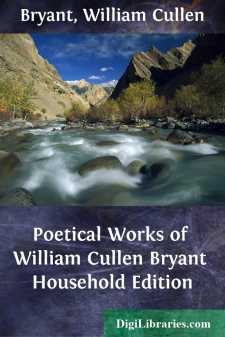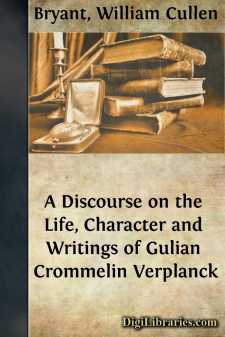Categories
- Antiques & Collectibles 13
- Architecture 36
- Art 48
- Bibles 22
- Biography & Autobiography 813
- Body, Mind & Spirit 142
- Business & Economics 28
- Children's Books 17
- Children's Fiction 14
- Computers 4
- Cooking 94
- Crafts & Hobbies 4
- Drama 346
- Education 46
- Family & Relationships 57
- Fiction 11829
- Games 19
- Gardening 17
- Health & Fitness 34
- History 1377
- House & Home 1
- Humor 147
- Juvenile Fiction 1873
- Juvenile Nonfiction 202
- Language Arts & Disciplines 88
- Law 16
- Literary Collections 686
- Literary Criticism 179
- Mathematics 13
- Medical 41
- Music 40
- Nature 179
- Non-Classifiable 1768
- Performing Arts 7
- Periodicals 1453
- Philosophy 64
- Photography 2
- Poetry 896
- Political Science 203
- Psychology 42
- Reference 154
- Religion 513
- Science 126
- Self-Help 84
- Social Science 81
- Sports & Recreation 34
- Study Aids 3
- Technology & Engineering 59
- Transportation 23
- Travel 463
- True Crime 29
William Cullen Bryant
William Cullen Bryant (1794-1878) was an American poet, journalist, and editor known for his significant contribution to early American literature. He is best remembered for his poem "Thanatopsis," which explores themes of death and nature, reflecting the Romantic movement's fascination with the natural world. In addition to his poetry, Bryant was an influential editor of the "New York Evening Post" and a strong advocate for liberal causes, including the abolition of slavery and workers' rights. His work helped shape American literary identity in the 19th century, blending European Romanticism with a distinctly American perspective.
Author's Books:
Sort by:
The ancestry of William Cullen Bryant might have been inferred from the character of his writings, which reflect whatever is best and noblest in the life and thought of New England. It was a tradition that the first Bryant of whom there is any account in the annals of the New World came over in the Mayflower, but the tradition is not authenticated. What is known of this gentleman, Mr. Stephen Bryant,...
more...
THE AGES. I. When to the common rest that crowns our days,Called in the noon of life, the good man goes,Or full of years, and ripe in wisdom, laysHis silver temples in their last repose;When, o'er the buds of youth, the death-wind blows,And blights the fairest; when our bitter tearsStream, as the eyes of those that love us close,We think on what they were, with many fearsLest goodness die with...
more...
Letter I. First Impressions of an American in France. Paris, August 9, 1834. Since we first landed in France, every step of our journey has reminded us that we were in an old country. Every thing we saw spoke of the past, of an antiquity without limit; everywhere our eyes rested on the handiwork of those who had been dead for ages, and we were in the midst of customs which they had bequeathed to their...
more...
Officers of the Society,Elected January, 1870. President, Thomas De Witt, D.D.First Vice-President, Gulian C. Verplanck, LL.D.Second Vice-President, John A. Dix, LL.D.Foreign Corresponding Secretary, John Romeyn Brodhead, LL.D.Domestic Corresponding Secretary, William J. Hoppin.Recording Secretary, Andrew Warner.Treasurer, Benjamin H. Field.Librarian, George H. Moore, LL.D. The life of him in honor of...
more...





